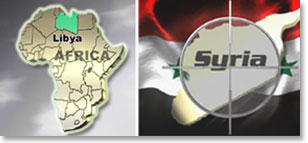Libya turns the nuclear spotlight on Israel (FCN, 01/26/204)

UNITED NATIONS (FinalCall.com) – The United States government lifted the 23-year-old travel ban against Libya on February 26, telling U.S. corporations to begin their return to the North African nation. Officials in the Bush administration said they were satisfied with Libyan President Muammar Gadhafi’s affirmation it was responsible for the bombing of PanAm Flight 103 in 1988.

Washington and the rest of the West will ease sanctions to allow U.S. oil companies, including Occidental, Conoco and Amerada Hess, to renegotiate contracts with Libya, according to Arab diplomats at the United Nations. Several diplomats, speaking to The Final Call under the condition of anonymity, said that removing the travel ban and allowing contract talks paves the way for renewing U.S. involvement in Libya’s oil industry.
The Libyan Arab Jamahiriya–which loosely translated means “state of the masses”–pumps approximately 1.4 million barrels of oil a day, according to the Financial Times newspaper.
However, a columnist writing in the New York Times said, “compromising with Libya now opens the Bush administration up to partisan charges that it is fully captive to the oil industry, bartering U.S. interests for barrels of oil.”
A journalist at the UN told The Final Call that Europe’s desire to end the ban on selling arms to Libya, which the U.S. says they won’t end, is a way of getting some of the Libyan oil wealth.
“In my opinion, the Libyan government and its leader are sincere in their desire to re-enter the community of nations,” Republican Representative Candice Miller said. She was part of a Congressional delegation, led by Pennsylvania Republican Representative Curt Weldon, that traveled to Tripoli, Libya to meet in a tent for two hours with Pres. Gadhafi.
Arab diplomats at the UN insist that Libya is intent on re-entering the mainstream of international affairs after years of isolation. “Libya has been pulling itself into a new position in world affairs,” the diplomats stress.
But, while relations have thawed between the U.S. and Libya, things are seemingly getting worse between the U.S. and Syria.
Secretary of Defense used an opportunity to blast the government of President Bashar al-Assad on February 23, while on a trip to the Iraqi capital city, Baghdad. Mr. Rumsfeld accused Syria of allowing militants in Iraq to carry out attacks. “We know Syria has been a hospitable place for escaping Iraqis,” Mr. Rumsfeld was quoted in the newspaper, The Syria Daily.
“We are not going to dignify such remarks with a comment,” Syrian UN Ambassador Fayssal Mekdad told The Final Call. He said Syria was still committed to the Middle East peace process in accordance with UN Security Council resolutions.
In January, the London-based Jane’s Intelligence Digest said the U.S. administration has long considered Damascus “a prime candidate for regime change.” Jane’s added that, during the past six months, Washington has increased its presence along the Syrian/Iraqi border and, on several occasions, has sent special forces into Syrian territory or penetrated Syria’s airspace.
Arab diplomats charge that it is America’s ally, Israel, that is pushing Washington into a possible confrontation with Syria.
In a recent incident, Jane’s reports that U.S. troops pursued suspected Iraqi militants into Syria and fought a running battle that left dozens of people dead, including some Syrians.
Analysts have said that Israel is angry with Pres. al-Assad’s position, which he reiterated in January: “Syria will not get rid of any weapons of mass destruction his country may possess unless Israel does the same.”
In defending the right of Syria to arm, he pointed to Israel’s recent attack on alleged Palestinian forces in Syria and the occupation of the Golan Heights, as evidence that Syria needed a military deterrent. “It is natural for us to look for means to defend ourselves,” Pres. al-Assad told the Daily Telegraph newspaper.
Pres. al-Assad called for the international community to support a proposal Syria submitted to the UN in April 2003, to remove all weapons of mass destruction from the Middle East, including Israel’s nuclear stockpile. He also blamed suicide bombers for the Israeli killings of Palestinians and the Israeli occupation. “Only Israel, when it stops killing, won’t have any more killing,” he stressed.
“The most dangerous thing in the Middle East is that Israel is allowed to possess all kinds of weapons of mass destruction, while Arab nations are denied these weapons under the pretext that Israel is under threat,” Arab diplomats argue in the corridors of the UN.
A representative from the Arab Group told The Final Call that a meeting of Arab nations would take place in Tunis, Tunisia in March, where they would come up with a clear stance that supports Syria in confrontations, accusations and challenges. The delegate added that, “Syria’s good relations with other Arab nations will make it impossible for any Arab nation to hesitate in supporting Syria.”












